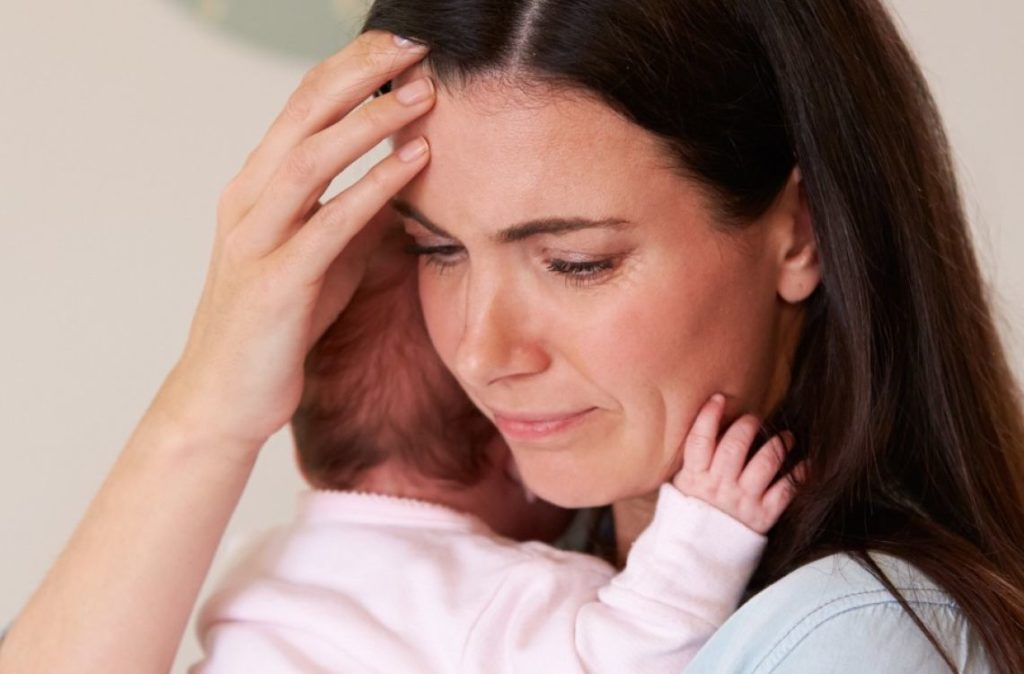As a new mother, you are facing a lot of challenges getting used to life with a newborn. You probably have to deal with lack of sleep, new responsibilities, or even breast pain if you are nursing. And what about your emotional state? Have you ever felt this emotional pain after your baby’s birth? Not the milder baby blues that typically go away after a week or two. We mean postpartum depression. What is postpartum depression? What are the symptoms? How do you know when you have it?
What is postpartum depression?
Postpartum depression, also called postpartum anxiety, is a type of depression you may get after your baby’s birth. It can start any time during your baby’s first year. You can begin to feel its effects during the first three weeks after birth. Postpartum depression does not affect only first-time moms. Every mother could get it even if they did not have it when their other children were born.
What are the symptoms of the postpartum depression?
If you notice several of the following symptoms, do not hesitate to consult your doctor :
- A great sadness which appears without any reason.
- Constant tiredness or sleeping problems ( you’re sleeping too much, or you’re not getting enough sleep).
- You feel worthless or excessively guilty about things you have done or not done (feeling of not being a good mother, difficulty to build rapport with your baby).
- Feeling irritable or rejection of your baby.
- Extreme anxiety.
- Incapacity of taking care of your baby.
- A lack of concentration.
- A disinterest in any activities or not taking pleasure when doing activities.
- Changes in appetite.
- Feeling that things won’t get any better.
Why do you get it?
There are many causes of postpartum depression. First of all, when you are pregnant, your hormone levels rise. After giving birth, your hormones suddenly drop. This quick change can trigger depression in some women. If you have had depression before, or it runs in your family, you may be more likely to have postpartum depression. Moreover, if you are already facing stress and problems in your life, those can be aggravating factors that lead to postpartum depression. Very young women who aren’t prepared to care for or support a baby are also at risk.
What is the difference between postpartum depression and baby blues?
Postpartum depression and baby blues share the same symptoms but are different.
Baby Blues
Baby blues or “syndrome of the third day” appears in the mother in the first days following the delivery. Symptoms include irritability, anxiety, vulnerability and mood swings. This transient reaction is linked to physiological changes (significant hormonal decline), increased stress and lack of sleep.
Baby blues can affect up to 50% of women. It is generally a short-term reaction which may last between few hours to 15 days. In most cases, the syndrome disappears by itself without any intervention.
In case you feel depressed, there are some things to do to help yourself feel better :
- Inform your husband and your family that you are not feeling well and that you need their help (look after your child, cook, clean the house…)
- Take care of yourself: sleep, take a bath (to avoid if you had a caesarean!), go out to clear your head and indulge yourself.
- Do activities with your little one: go out and play with your baby or have skin-to-skin contact with your baby…
Postpartum Depression
After several weeks, if you still feel sad and overwhelmed or if you feel less interested in your baby, you do not suffer from baby blues but probably postpartum depression.
The main differences between postpartum depression and baby blues are the symptoms severity and the length of the period of illness. Postpartum depression may be manifested at any time in the first year after your baby’s birth. It can be related to physiological changes as baby blues but also to essential changes in your new life as a mother.
Have you ever faced postpartum depression or baby blues one time? Share your experience and feelings with other moms by letting a comment below.
You may like this article: 11 STEPS TO A HAPPY, STRESS-FREE PREGNANCY!
Previous article: 5 GOOD REASONS TO COOK WITH YOUR KIDS
Read previous articles here.
Find baby and kid products here.
Disclaimer: The information provided in this article is for informational purposes only and should not be considered as medical advice from Motherhood. For any health-related concerns, it is advisable to consult with a qualified healthcare professional or medical practitioner.
For more insightful stories and fun recipes, stay tuned to Motherhood Story!
